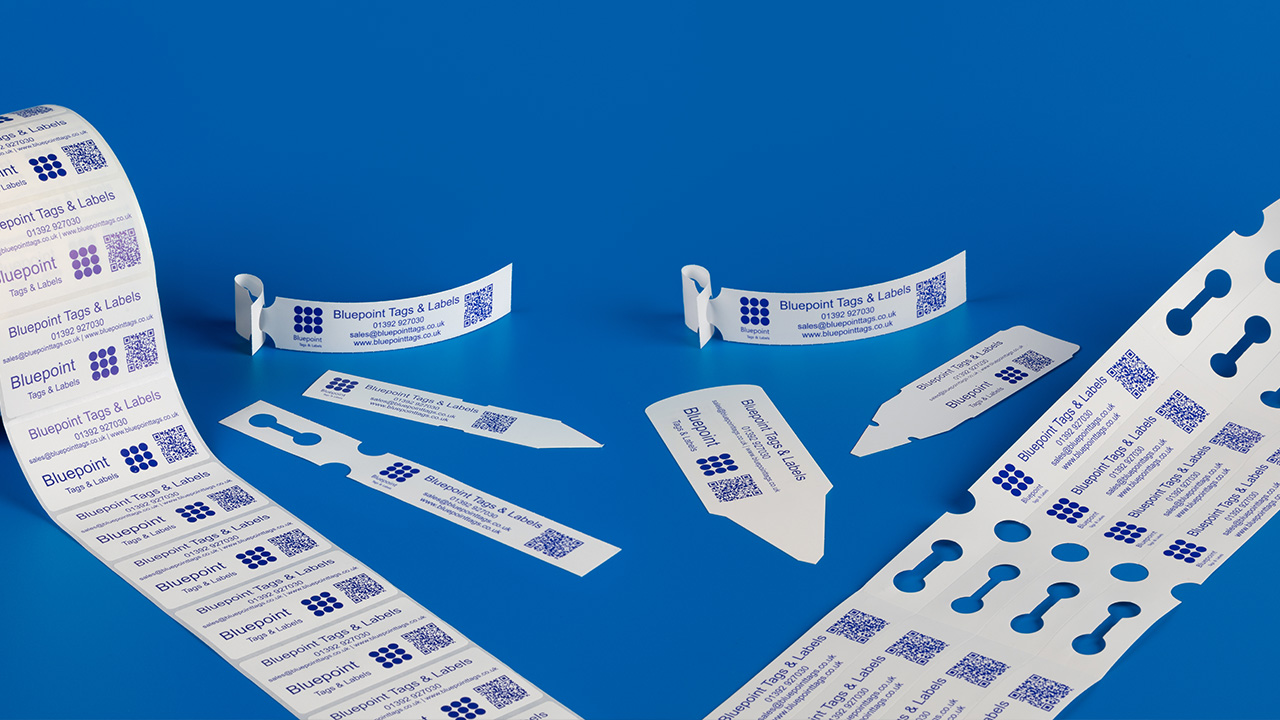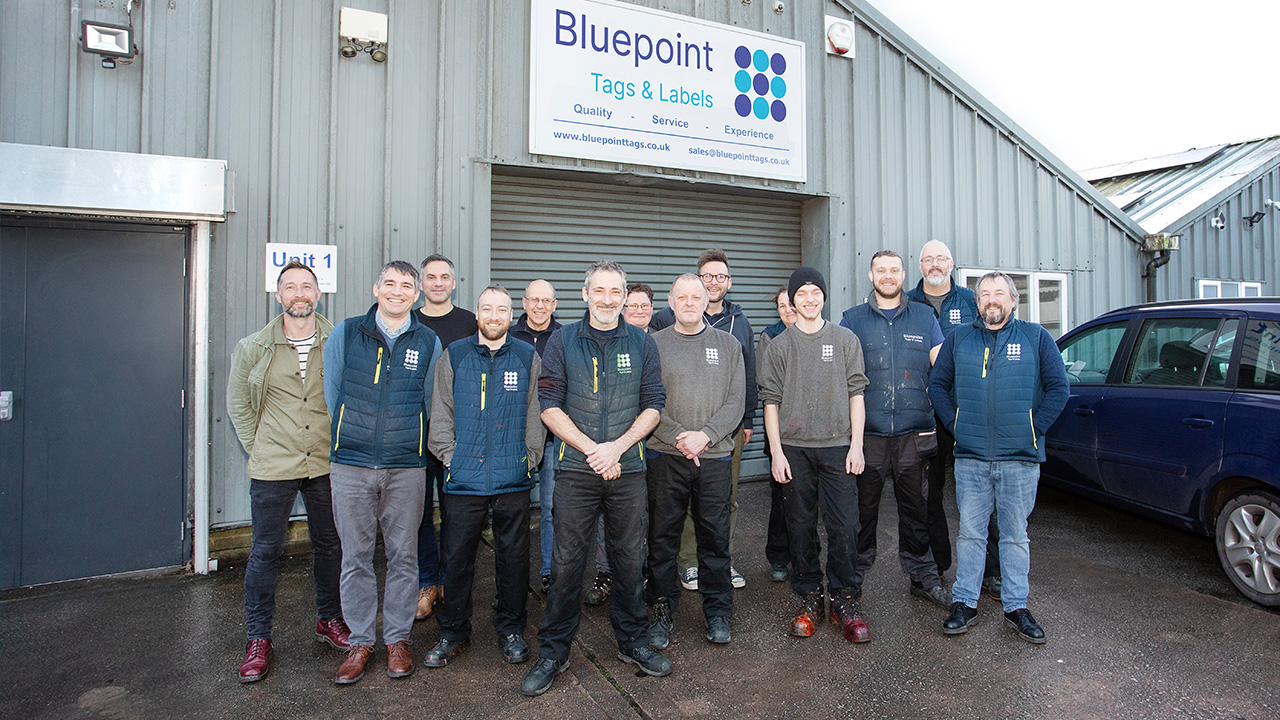Bluepoint Tags and Labels: Growth through sustainability
Driven by a clear mission to make a meaningful impact, UK-based Bluepoint Tags and Labels is now a leading name in the tags and labels market.

Rob Burton and Iain Pringle founded Bluepoint Tags and Labels in 2017
Founded in 2017 by Rob Burton and Iain Pringle, Bluepoint Tags and Labels was born out of a desire to do things differently. Both had long careers in the tags and labels industry, having now worked together for over 30 years, including during their tenure at Longcombe Labels in South Devon. Their work ethic and vision marked their journey for what a customer-centric, innovative label manufacturer could achieve.
‘We both wanted to do things differently,’ says Pringle. ‘With our extensive knowledge and passion for the industry, we were confident we could offer more than just labels; we could offer a service with a true focus on innovation and customer satisfaction.’
In 2017, Bluepoint Tags and Labels was born. Now based in Totnes, Devon, the company has grown steadily over the years, securing a turnover fast approaching 3 million GBP (3.7 million USD), a testament to the team’s dedication and relentless focus on delivering high-quality products. Their story has been one of gradual growth, overcoming the challenges of starting from scratch and competing with established players in the sector.
“We knew we could do things differently. With our extensive knowledge and passion for the industry, we were confident we could offer more than just labels”
The first orders came through word of mouth and referrals, as Bluepoint built a reputation for producing tough, reliable tags for harsh environments. With their first press, a second-hand Mark Andy 2200, Burton and Pringle were able to hit the ground running, taking on jobs from industries such as steel, construction and horticulture. But it wasn’t just about the machinery. They knew that to succeed, they had to focus on building long-term relationships with customers as well as suppliers.
‘We knew that the key to success was in developing strong customer relationships and offering value beyond just the label itself,’ says Burton.
The growth was not without its challenges. Early on, they faced issues with expensive machinery and high tooling costs and the nature of the work itself — creating tough, durable tags and labels for demanding environments — meant that every order had to be delivered with precision. The barriers to entry in this industry were high, and starting from the ground up meant investing heavily in equipment and materials.
‘There were moments where it felt overwhelming, tight margins, cash flow challenges and all the complexities that come with starting a business,’ recalls Pringle.
Despite the challenges, its experience and commitment to customer satisfaction allowed Bluepoint to grow rapidly. Within four months of launching, and thanks to a fast uptake in their products, Burton and Pringle ordered a second Mark Andy press to keep up with growing demand. The business moved from a small unit at Exeter Airport, affectionately known as the ‘Tin Shed,’ to a larger 4,000sqft factory in Totnes by 2019.
This expansion marked the start of a period of significant machinery investment. In 2020, Bluepoint invested further into its production, which included a third complete press. This new machinery came just as the Covid-19 pandemic disrupted operations worldwide, but Bluepoint’s agility and commitment to customers allowed it to weather the storm.
Growth driven by innovation and customer service
Burton and Pringle credit the company’s growth to a combination of factors.‘First and foremost, we’ve always emphasized customer service. That’s been the cornerstone of our business,’ notes Pringle. ‘But also, we’ve never stopped investing in the business. We continually look for new technologies and materials to enhance our offerings.’
The company has quickly embraced new developments in the industry, including sustainability practices that have become increasingly important in recent years.

The rapid expansion also saw the company diversifying its product range. From industrial tags for the horticulture, steel and chemicals industries to more specialized tags for the food production sector, Bluepoint became a reliable partner for customers who needed durable and well-designed labels.
‘Our growth didn’t just come from customer acquisition; it came from listening to our customers and adapting to meet their needs,’ Burton states.
Focus on sustainability
Sustainability has been a focus for Bluepoint Tags and Labels since its inception, but it has taken on even more significance in recent years. The company is keenly aware of the environmental impact of the labels and tags industry, which relies heavily on synthetic materials and plastics.
‘We’re well aware of the challenges the industry faces in terms of sustainability,’ says Pringle. ‘But we also believe that we can make a real difference by using recycled and recyclable materials wherever possible.’
Bluepoint’s commitment to sustainability is evident in its wide range of sustainable products. Its Recyclaband product, for example, is a wristband made from a PVC-free, sustainably sourced, paper-based stock.
In other applications where the ultimate longevity of plastics isn’t required, the company is already utilizing sustainably‑sourced, fully recyclable paper-based products that offer a genuine alternative to synthetic materials.
Elsewhere, Bluepoint is using a repurposed glassine liner on several of its product lines, seeing significant carbon savings by utilizing materials in their second life.
Burton and Pringle’s choice of materials is not only environmentally friendly but also durable, ensuring that they can still perform well in harsh industrial environments.
“With 2.83 MWh being generated from the solar panels in the last three months alone, we’ve already saved 608.1 kg of CO2, equivalent to planting 37 trees”
‘We’ve been searching for sustainable materials for years, and the market is starting to catch up. Where compostable materials can be used, they are,’ Pringle explains.
Bluepoint is committed to keeping plastics in the circular economy for as long as possible while continuing the search for a sustainable plastic alternative that can withstand the tough demands of industrial environments.
However, to counter the use of unavoidable synthetic materials, Bluepoint has, for a long time, been looking to reduce its own impact on the environment; although there are many carbon offsetting schemes available to businesses, Burton and Pringle chose to make a real difference in the heart of their factory.
In 2024, Bluepoint invested significantly in solar energy by installing solar panels on its factory roof. As a heavy energy user, the company was keen to reduce its reliance on external electricity and lower its carbon footprint.
The solar panels have already started to show results. Despite the investment finalized in the middle of the dark, wet Devon winter, the panels already generate 10 percent of the factory’s electricity needs.
‘With 2.83 MWh being generated in the last three months alone, we’ve already saved 608.1kg of CO2, equivalent to planting 37 trees,’ says Pringle, highlighting the impact of their solar investment.
When the sunny summer days arrive, the company projects that 100 percent of its energy use will come from its own solar-generated electricity, with an estimated excess of 20 percent being fed back into the grid - seeing a project saving in annual energy costs of more than 40 percent.
In addition to the solar panels, Bluepoint has switched to low-energy LED lighting throughout the factory installed EV charging points and switched to a heatpump for factory heating.
‘It’s all about making a real difference,’ Pringle explains. ‘We want to do our part in reducing carbon emissions, but we also want to show that it’s possible to save money while doing so. The savings on energy costs allow us to reinvest in the business and pass those savings on to our customers.’
Further plans for the company’s sustainability initiatives include the complete transition of all company vehicles to electric vehicles (EVs) by 2025. The company’s commitment to sustainability is motivated by environmental concerns and the desire to offer customers more eco-friendly options.
‘We know that sustainability is increasingly important to our customers, and we want to be able to offer them products that align with their values,’ adds Burton.
Expanding horizons
Looking ahead, Bluepoint Tags and Labels has big plans. The company is focused on expanding its reseller base and increasing export sales.
‘We’ve had great success in the UK market, but now we want to extend our reach to international markets,’ comments Pringle. ‘We’re currently working on appointing agents in overseas territories and exploring new opportunities for growth.’
As for the future of product development, Bluepoint is committed to continuing to innovate in the tags and labels sector. The company does not stop exploring new materials and technologies to offer even more sustainable options for its customers.
Further to this, Burton and Pringle have recently invested in a BGM Elite eDSR semi-automated turret rewind machine, adding further automation and efficiencies to the production line.
‘We’re constantly looking for ways to improve our products and services,’ highlights Pringle. ‘Whether it’s through new materials, better production processes, or by offering more personalized solutions for our customers, we’re always looking to push the boundaries.’
With a strong foundation in place and an eye on the future, Bluepoint is well-positioned to continue growing and evolving in the fast-paced and ever-changing tags and labels industry.
The next chapter for the company is all about scaling its operations, both in terms of product offerings and geographical reach.

‘We’re excited about the opportunities ahead. There’s a lot of potential for growth, and we’re ready to seize it,’ shares Burton.
Since its founding in 2017, Bluepoint Tags and Labels has come a long way. What started as a small business in a ‘tin shed’ has grown into a successful company with a multi-million-pound turnover. Despite the challenges faced along the way, the company’s commitment to quality products, customer service and sustainability has been key to its success.
‘The biggest reward for us has been seeing how far we’ve come. It’s been an exciting journey, from working out of a small unit to expanding into a larger factory, all made possible by the fantastic team we have here.
‘We’re not done yet, though. We’ve got big plans for the future, and we can’t wait to see where this journey takes us,’ concludes Pringle.
Click here to find out more about Bluepoint Tags and Labels.
Stay up to date
Subscribe to the free Label News newsletter and receive the latest content every week. We'll never share your email address.


